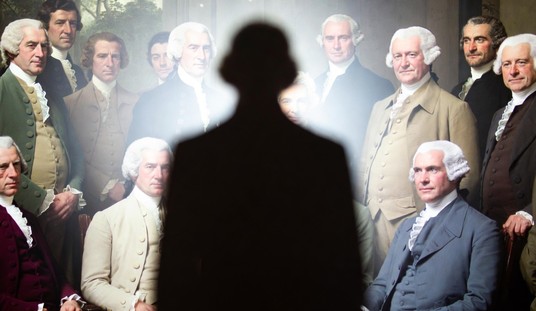Patrick McGoohan’s The Prisoner, a 17-part serial of which he was the star and one of the writers and directors, is one of the great cultural legacies of the late Sixties for several reasons:
- Its portrayal of “The Village,” a synthesis of the ideal English seaside resort with the total-surveillance nightmare of Orwell’s 1984;
- The varied and ingenious series of trials of his intellect, his ingenuity , and his integrity to which McGoohan’s unnamed protagonist was put;
- The exceptional quality of the scripting and acting throughout;
- The care put into retaining the key ambiguities, which was apparently one of McGoohan’s priorities.
Nothing quite brings home the uniqueness of the series as powerfully as that last point, which is heated to a rolling boil in Episodes 16 and 17, co-starring the immortal Leo McKern.
McGoohan once said that the key theme of The Prisoner is that “Freedom is a myth”:
Interviewer Warner Troyer: This is a kind of banal question I guess, but if you could leave one sentence or phrase or paragraph in the head of everyone who watched The Prisoner series – the whole series – one thing for them to carry around for a while when it was over, what would it be?
McGoohan: Be seeing you.
http://www.youtube.com/watch?v=WiIUnCMpGbM
This was an invocation of The Village’s relentless surveillance of Number Six, for whom The Village was putatively created as a place of confinement and trial.
McGoohan’s perspective on freedom-as-myth partakes critically of the concept of purposeful self-command as the negation of freedom. This is underlined by contrast: through the condemnation, in the final episode, of Number 48 — “uncoordinated youth; rebelling against nothing it can define,” — and Number 2 (Leo McKern) — “an established member, turning upon and biting the hand that feeds him.”‘ For all revolts against control will be either thematic or unthematic. In the former case, the rebel defies an external locus of control; in the latter, there is none. The sole unaddressed alternative is internal control: self-command in obedience to values and priorities one enforces upon oneself.
In this regard, let us hearken back to episode 16, in which McKern’s Number Two strains to break Number Six’s will at long last, and pays dearly for it:
Number Two: Why did you resign?
Number Six: For peace.
Number Two: What peace?
Number Six: Peace of mind.
It seems that McGoohan, in couching the line that way, was emphasizing that the point of Number Six’s resistance was merely to reaffirm his will to resist: a rebellion against external control whose aim was solely to break that will. The theme is freedom and only freedom… but Number Six’s self-command, which he has asserted throughout and against which he will not rebel, remains in place.
https://www.youtube.com/watch?v=tra3Zi5ZWa0
The seemingly random qualities of the final episode’s concluding sequence underline the irrationality of a power determined to break a man simply to prove that it can do so, and the adamantine power of individual will asserted against so seemingly irresistible a foe to do so and for no other reason. After all, the point of The Village was supposedly to winkle out why Number Six had resigned his “state secret job.” Yet we are invited to infer, from the opening sequence to every episode, that he had vehemently announced his reason — though we aren’t permitted to hear it explicitly — upon presenting his resignation to his superior. That put the authorities behind The Village in the position of demanding an answer already rendered…but why? Because they didn’t believe what they’d been told? Possibly, but more likely because merely in resigning that “state secret job,” Number Six had committed the ultimate sin: he had denied The State his services.
In this connection I will note something most commentators on The Prisoner have neglected to consider: the influence of McGoohan’s lifelong Catholicism. The Catholic faith emphasizes self-command as do few others. We are encouraged to develop it early and to strengthen it at every opportunity, that it will serve us against the temptations of temporal life. From that perspective, individual freedom, though not precisely a myth, is nevertheless an ambiguous thing: a panorama of opportunities to do well or ill. Self-command equips us to choose the former and decline the latter, even when the former is stark and difficult while the latter promises endless delights.
To insist on self-command — Catholics call this a well-formed conscience — is to impose an authority upon oneself to whom no excuses for deviation can ever be convincing. For it is the cameras of that Village inside us that we can never escape nor evade. Note that when Number Six has just been shouted down by “the delegates” to whom he’d attempted to explain the ethical grounds for his “rebellion” against the Village and its conditioners, he is introduced at last to the long-sought Number One, and finds himself staring at his double.
Patrick McGoohan died on January 13, 2009, survived by his wife of 58 unbroken years Joan Drummond and his three beloved daughters Catherine, Anne, and Frances. Though The Prisoner was only one of his many achievements, it seems appropriate that it should be the one for which this exceptionally fine actor and man is most vividly remembered.









Join the conversation as a VIP Member